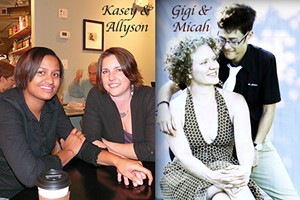Love is beautiful.
It lets the heart sing, defies reason or intellect, makes the world go round.
Love is eternal. Love is a flame. Love is what we are all searching for, and what the lucky few of us have found.
For this year’s Valentine’s Day issue, we wanted to write about love in its purest form —romantic love as experienced between two partners fully committed to each other, bound for life, for better or worse.
Whenever two people join together as one, love exists between them, no matter if they speak different languages, come from different backgrounds, have different skin color or — as is the case with the subjects in this week’s cover stories — share the same gender.
Love is love. And it is always beautiful.
Love between same-sex partners is identical to the love shared by couples who may be more biologically compatible. They walk through life hand in hand, plan futures together, get shivers when they look deeply into one another’s eyes. Just like the rest of us.
But love — this particular kind of love — is under attack by factions within our sate government looking to eke out an edge in the polls. A referendum has been placed on the ballot in the May 8 primary election purporting to defend marriage between one man and one woman — something already enunciated by sate law — but which will actually curtail many of the freedoms which the couples in the following pages already enjoy: shared finances and property, joint healthcare coverage, the right to be standing by when the ones they love breathe their last, all enshrined in our state constitution.
It is hateful and petty, driven by callousness and fueled by fear. And we implore our readers to vote in the primary, if only to help make North Carolina the only state in the South to recognize love in al its forms, not just those so narrowly defined by special interests.
Love is God’s gift, one of the proofs that He exists, along with music and laughter and the changing of the seasons. If you are fortunate to have found someone to love and who loves you back, you already know this. And love is not for us to define. It is ethereal, not of this world. Who someone else chooses to love, and how they express it, is not anyone’s concern but their own.
There is nothing unique about the couples featured in these pages. Like couples everywhere they want to be together forever, to create good times and memories and bring each other comfort when times get bad, as they surely will. They have found happiness in each others’ arms, and that is what love is all about.
It is worth remarking that three of the couples we asked to partcipate in this week’s issue reneged at the last minute — though they are “out,” they worried about repercussions from media exposure from work and family. We have comer a long way, but there is still more road to travel.
Where true love exists, there is no room for hate. No place for judgment. No quarter for those who try to tear it asunder.
Love is beautiful. Always and forever.
Kasey and Allyson
by Jordan Green
They got to know each other while meeting for drinks with mutual friends from Bin 33. Allyson Clark, a social worker at Triad Health Project, had recently quit the restaurant, and Kasey Horton, a viola player and alum of UNC School of the Arts, had just started.
Clark pursued Horton over the following months.
“She tried to ask me out a couple times, but I was with someone else,” Horton recalls.
“I was trying to flirt with her, but I was getting no response,” Clark confirms.
Four months later, after a second social outing with their Bin 33 friends, Clark sent the e-mail that got Horton’s attention.
“Besides the obvious, I don’t think anyone’s ever asked me out on a date,” Horton says. “She seemed cool-ish. She’s older than me. There’s a 12-year difference in our ages. So I wanted to see what that was like.”
For their first date they went to a show at Glenwood Coffee and Books that was part of a local music festival. They got drinks and talked. Horton had to leave for a rehearsal with her band, Amelia’s Mechanics, but they hit it off so well that they decided to meet up afterwards for a second show at the Flatiron.
There was no doubt from that first date that they were going to be together. Clark felt instantly comfortable and able to be herself. Horton knew she had found something beyond the tentative nature of previous relationships.
Their relationship has blossomed from a sense of assurance that comes from each woman being comfortable with her sexuality. They laugh a lot together. And each knows she can depend on the other.
“She is a very mature woman who formally contacted me and asked me out on a date,” Horton says, reaching across a table at the Green Bean coffeehouse to grasp Clark’s wrist.
“We both had the same idea of relationships,” Horton continues, adding as she turns to her partner: “You’re gay.”
Clark laughs as she confirms the fact.
“We’re both comfortable that we’re lesbians,” she says. “You meet a lot of gay people who aren’t sure.”
The sense of emotional security Clark and Horton give each other comes across in easy laughter, gentle and affectionate touches and smitten sidelong glances.
Clark works traditional 8-to-5 hours at Triad Health Project and Horton’s work as a host at two restaurants and as a musician keeps her busy in the evening, so they’ve had to be creative about making time for each other. They enjoy socializing with friends and also staying home and cooking dinner together. They feel blessed to be welcomed by each other’s parents.
It would be hard to imagine two people more compatible.
“We both love being outdoors and active,” Clark says.
“We both love live music,” Horton adds.
“Cooking, food, dogs… camping,” Clark continues. “I’ve never found anyone who likes camping, so that’s exciting.”
Horton describes herself as “the type of girl that likes long-term relationships.”
“I’m a very family-oriented person and I want to have a family someday,” Clark says. “My goal is not much different from any heterosexual couple. It’s to find someone I can marry and have kids with. So it’s utterly ridiculous I can’t do that.”
That a constitutional amendment is on the ballot in May to define marriage as being between a man and a woman strikes the couple as absurd considering that same-sex marriage is already illegal in North Carolina, but they worry about the effect it could have on domestic partnerships.
“It would affect domestic partnerships because simple things like visiting someone in the hospital, basic rights [would be compromised],” Clark says. “To think that if something were to happen to Kasey I wouldn’t be able to visit her is scary, sad and frustrating.”
Clark and Horton know their love is still young, but at this stage they envision themselves in a long-term relationship.
“I kind of want to marry her someday,” Horton says quietly.
Promptly and with solemnity, Clark responds, “It could happen.”
Gigi & Micah
Gigi & Micah
by Eric Ginsburg
Even though they’ve been together for 10 years, Gigi Burkhalter and Micah Guindon hadn’t lived alone together until a few months ago. When a roommate moved away, they chose not to look for a replacement, transitioning out of years of living more collectively.
“Living with people over the years has really shaped us,” Guindon said. “That family feeling in our home is important to us. It’s kind of nice now just to have us to take care of.”
Living alone has meant less pressure to wake up early on the weekends, but also has been something new for the couple to experience together, along with their two dogs Sunday and Mason.
“We built a home as a collective of best friends rather than of just like-minded people,” Burkhalter said. “After 10 years, few new things occur, but here we are making a home just the two of us.”
Guindon and Burkhalter met during the fall semester of 1999 as students at Guilford College, both taking the same anti-racism training and continuing to do anti-racist work with other white people. That summer they lived together with friends in Asheville, and the boundary of their friendship and romantic relationship was blurry.
Mutual friends sometimes asked why they weren’t together, and the two often pretended to be oblivious to what friends were talking about. Their close friendship continued to develop, but it wasn’t until two-and-a-half years after they met that they got together.
Their relationship has changed and taken them various places over the years, including a six-month stint in Chile — where Burkhalter’s family is from and where numerous relatives still reside — after they both quit their jobs and weren’t sure they’d return to Greensboro.
Yet for the past eight years, they’ve lived in the same house west of UNCG between Lindley Park and Sunset Hills, with Burkhalter working as a graphic designer and web developer and Guindon as a program manager at an adult-literacy agency.
They try to take a weekend each year to reflect and outline their goals for the coming years, and that intentionality is part of what makes their relationship so successful, Guindon said.
To honor their 10th anniversary and as a ceremony for moving forward, the two are inviting friends and family to a celebration.
“We’re working against a lot and [homophobia] has negatively impacted our relationship,” Burkhalter said. “This ceremony is a way to combat that in a loving and healing way. I don’t really want to fight for love. I want to fight for other things.”
The next major step in their relationship that both of them have in mind as they try to plan intentionally and pull together the celebration/ceremony is their interest in having a child or children together. The ways North Carolina laws are written, they’re facing an uphill battle whether they adopt or conceive, particularly because of their inability to both claim legal parental status and the implications that carries for health insurance coverage in particular.
“If I birth a child, Gigi wouldn’t have any legal parenting rights,” Guidon said. “We’re not covered by each other’s insurance plans. One working partner couldn’t cover the other if one of us stayed at home with our child.”
As they weigh their options for having children and see the statewide vote looming on amending the definition of marriage and domestic partnership to be more restrictive, family members in other parts of the country have asked why they don’t move or get married elsewhere.
“There are a lot of other places in the country that would just be easier to live,” Guindon said. “We feel like North Carolina is home. On one hand I feel nervous about bringing a child into the public school system in this town. It’s even easier in other places in this state.”
Their sense of place and strong community here keep them from wanting to leave, and even while Burkhalter may be tired of fighting, both of them are part of the relational organizing group All of Us NC working against the proposed amendment. On top of that, they helped create
whatireallywantformybday.com, a website designed for people to pledge their vote against the amendment as a birthday gift.
Even if same-sex marriage were legal in North Carolina, Burkhalter and Guindon wouldn’t be first in line to get married, but they would welcome the same legal rights as other North Carolinians, particularly with their future children’s best interest in mind.




